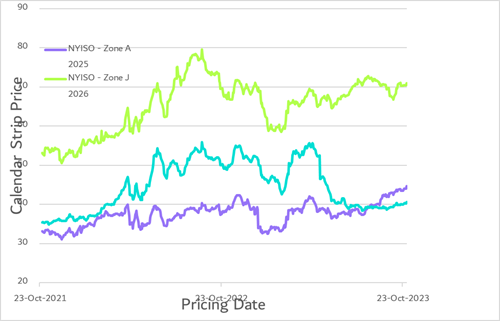Smartest Insight | Issue 140

Our weekly company round-up covers the key market and industry news in one place, so you don’t have to look any further to stay ahead.
October 26, 2023
Market Update:
Last week's storage prediction of 80 BCF fell below actual of 97 BCF. The market responded by dropping $0.15/MMBtu on the day to $2.96 for prompt month gas. The market continued to trend downward to a low of $2.86 on 10/22 before recovering most of those losses and now trading at $3.00 where we are still down $0.07 compared to last Thursday.
We can attribute this gains to two factors. The 1st is a reduction in production due to planned outages due to generation site maintenance. The 2nd, news regarding the delay in operations for the Mountatin Valley Pipeline. The project has experienced a series of delays including the latest one announced this week due to lack of skilled labor and resources. The new flow start date is targeted for Q1 2024.
Even though winter forecasts predicts warmer than normal temps across the country. The market is not ready to give up the winter premium embedded in pricing. We can expect prices decrease slowly as we head into the colder months. However, any hint of colder temps will rally pricing. This winter there is more upside risk than downside risk. The storage expectation for the week ending 10/20/23 is for a build between 78-82 BCF.

Regulatory Report:
NY Governor’s veto to impact offshore wind development
New York Governor Kathy Hochul has vetoed legislation that would have facilitated Equinor and bp in building transmission lines to connect over 1.2 GW of offshore wind power to Long Island's utility grid. The offshore wind industry and bill supporters expressed disappointment as the veto is seen as hindering the state's clean energy goals and potentially stalling development. Equinor Renewables Americas President Molly Morris criticized the decision, emphasizing the role offshore wind plays in achieving renewable energy mandates. The veto is the second setback for Equinor and bp, as their requests to raise power prices for ratepayers were denied earlier by the New York State Public Service Commission.
The legislation, known as the Planned Offshore Wind Transmission Act, would have directed local authorities to convey property interests for constructing a 12.2-mile-long underground transmission system. Governor Hochul's veto statement underscores the importance of local government sovereignty in deciding not to allocate parkland for the offshore wind project, instead urging renewable energy developers to directly negotiate with local host governments.
The American Clean Power Association warned that the veto could harm offshore wind development in New York, potentially jeopardizing the state's 70% clean energy goal by 2030. The bill would have allowed local governments to negotiate for the delivery of power generated by offshore wind. Long Beach City Council President John Bendo pointed out that Equinor had not adequately addressed the city's concerns, and the transmission system's construction would have caused significant traffic congestion for up to two years.
Project Maple aims to expand Algonquin pipeline in New England.
Enbridge, a Canadian energy company, is looking to expand the Algonquin Gas Transmission pipeline in New England. This expansion, known as Project Maple, aims to address the growing demand for natural gas pipeline capacity in the region. The project will primarily serve customers north and west of Boston, as well as areas south of Boston, extending to Cape Cod and Rhode Island.
The Federal Energy Regulatory Commission has expressed concerns about the reliability of the power grid in the region, making Project Maple a solution to ensure consistent access to fuel for power generation and meet the increasing demand from gas utilities.
The final scope and capacity of Project Maple will be determined based on responses from shippers during the open season, which started on September 12 and closes on November 12. The project's goal is to provide a reliable supply of natural gas during peak daily demand, stabilize energy prices, and support New England's efforts to reduce greenhouse gas emissions on its path to net zero. Project Maple is expected to be in service as early as November 2029.
